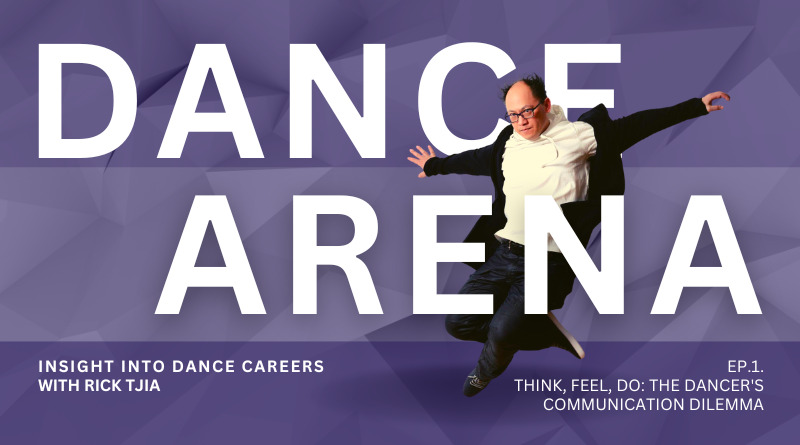Dance Arena with Rick Tjia Ep. 1. – Think, Feel, Do: The Dancer’s Communication Dilemma

One of the most important, nay, one of the most essential questions in the world consists of one single word: “Why?”
Dancers don’t really ask that question. Choreographers certainly don’t ask it nearly enough. Actors do ask it, perhaps even too much, but they don’t always seem to listen to the answer.
I am going to start this article with this exact question – why? Why do we dance?
Why do we sing? Why do we paint? Why do we write?
And the answer is the same one that I give over and over again, in conversation, while teaching, while having a pint with the boys (or with the girls, as the case may be; I tend not to converse about things like football): to communicate.
Hearing myself say it over and over, I unfortunately find that the word is starting to become a cliché for me. When I look in a thesaurus for synonyms, I find, amongst others, the words “connect”, “contact”, and “convey”. In the long list of other synonyms I do not find any one word that effectively englobes what the actual word “communication” does –but perhaps these three synonyms can effectively portray at least the concept. And although the word “communication” may become a cliché, I can only hope that the concept does not.
The communication between individuals dancing is undeniable. We dance because there are some things that just cannot be communicated with words. Dance is an abstract language, and as such does not follow the same rules of narration as storytelling or traditional theater (although we keep trying to do so, with varying lukewarm degrees of success).

Since we are human beings, we are characterized by three processes tightly linked with communication. We think, we feel, we do. That simple.
The “doing” part is never a problem for dancers. The feeling part – questionable. In my experience, dancers do a lot to try and hide this part, whether consciously or unconsciously. And when they go on stage, they fabricate feeling, often explained away by citing what their character should be feeling, and subsequently justifying burying their own emotions even deeper into their little internal box.
But there is always a touch of reality in interpretation. There is if you are good, anyway. In order to touch another human being, you cannot fabricate emotion. You just redirect it and put it in a different context.
The “thinking” part, for dancers, is also questionable. Most either overthink things or they just don’t. Tell me what to do and I’ll follow without question. The process of analysis is an unfortunately underrepresented aspect of the dance world.
Think, feel, do. That simple. Or at least, it should be.
As dancers striving to project something on stage, you must understand that the mind, body, and the heart are the three things that make us all uniquely human. If you hope to touch an audience with what you do on stage, then you must be prepared to use all three.
Otherwise the concept is lost, and only the cliché remains.
Editor's Note: At StageLync, an international platform for the performing arts, we celebrate the diversity of our writers' backgrounds. We recognize and support their choice to use either American or British English in their articles, respecting their individual preferences and origins. This policy allows us to embrace a wide range of linguistic expressions, enriching our content and reflecting the global nature of our community.
🎧 Join us on the StageLync Podcast for inspiring stories from the world of performing arts! Tune in to hear from the creative minds who bring magic to life, both onstage and behind the scenes. 🎙️ 👉 Listen now!
